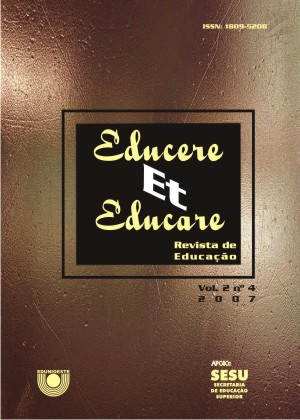THE IMPLEMENTATION OF SOCIAL STUDIES IN THE STATE SCHOOLS CURRICULUM IN THE 1970S AND UNDERGRADUATE TEACHERS DEVELOPMENT
DOI:
https://doi.org/10.17648/educare.v2i4.1664Keywords:
ensino, estudos sociais, formação de professoresAbstract
This work looks at how the implementation of Social Studies in public elementary and high schools occurred in the 1970s and verify the academic formation of the educators who were responsible for that subject at that time. The sources for this research were reports from observation of teaching who attended teaching practice for the undergraduation course in History at University of São Paulo. This study found that the majority of those teachers that taught classes in Social Studies in the first years of its implementation, majored in teaching courses of History (to teach elementary school and high school students). After the creation of the undergraduation course in Social Studies (to teach just elementary school students) the situation altered, because the professional graduated in this field after two years studying, could teach many subjects. The History classes were reduced after the implementation of educational reforms, which promoted the teaching of Social Studies. During those years, some educators who majored in History were able to teach other subjects, which became complementary, and eventually these professionals could organize the curriculum according to their pedagogical practice.Downloads
Published
01-01-2000
How to Cite
MIMESSE, E. THE IMPLEMENTATION OF SOCIAL STUDIES IN THE STATE SCHOOLS CURRICULUM IN THE 1970S AND UNDERGRADUATE TEACHERS DEVELOPMENT. Educere et Educare, [S. l.], v. 2, n. 4, p. p. 193–204, 2000. DOI: 10.17648/educare.v2i4.1664. Disponível em: https://saber.unioeste.br/index.php/educereeteducare/article/view/1664. Acesso em: 2 dec. 2025.
Issue
Section
Núcleo Temático: Aprendizagem e Ação Docente
License
Aviso de Direito Autoral Creative Commons
Política para Periódicos de Acesso Livre
Autores que publicam nesta revista concordam com os seguintes termos:
1. Autores mantém os direitos autorais e concedem à revista o direito de primeira publicação, com o trabalho simultaneamente licenciado sob a Licença Creative Commons Attribution que permite o compartilhamento do trabalho com reconhecimento da autoria e publicação inicial nesta revista.2. Autores têm autorização para assumir contratos adicionais separadamente, para distribuição não-exclusiva da versão do trabalho publicada nesta revista (ex.: publicar em repositório institucional ou como capítulo de livro), com reconhecimento de autoria e publicação inicial nesta revista.
3. Autores têm permissão e são estimulados a publicar e distribuir seu trabalho online (ex.: em repositórios institucionais ou na sua página pessoal) a qualquer ponto antes ou durante o processo editorial, já que isso pode gerar alterações produtivas, bem como aumentar o impacto e a citação do trabalho publicado (Veja O Efeito do Acesso Livre).
Licença Creative Commons
Esta obra está licenciada com uma Licença Creative Commons Atribuição-NãoComercial-CompartilhaIgual 4.0 Internacional, o que permite compartilhar, copiar, distribuir, exibir, reproduzir, a totalidade ou partes desde que não tenha objetivo comercial e sejam citados os autores e a fonte.


